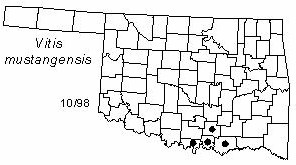High-climbing woody vine. Branches white-tomentose when young, becoming glabrous. Tendrils branched. Leaves broadly triangular-ovate or reniform-ovate, 6-14 cm (2.4-5.5 in) long and as wide or wider, white-tomentose on both surfaces when young but becoming almost glabrous above, basal sinuses open or subtruncate, sinuately and shallowly toothed, almost entire to deeply lobed. Inflorescence a dense compound panicle 5-12 cm (2-4.7 in) long, flowering in spring. Fruits 15-20 mm (0.6-0.8 in) in diameter, usually purple-black and not glaucous, sometimes with a disagreeable flavor.
Distribution: Native to Alabama, Arkansas, Louisiana, Oklahoma, and Texas.
Habitat: forest margins, fencerows, etc.
NWI status: none
Comment: Vitis is the old Latin name for grape; mustangensis is derived from mesteņo, Spanish for strayed or feral, although the term is usually applied to horses.
Distribution in Oklahoma: 
BACK
NEXT
RETURN TO INDEX
Last update: 9/22/99
 Go to Oklahoma Biological Survey Home Page
Go to Oklahoma Biological Survey Home Page
 Disclaimer
Disclaimer